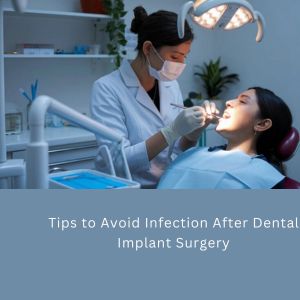What is a Dental Implant?
Dental implants are titanium posts that are surgically inserted into the jawbone to replace the roots of missing teeth. Over time, the bone fuses with the implant in a process called osseointegration, providing a sturdy foundation for artificial teeth like crowns, bridges, or dentures. Dental Implants in Gurgaon have become a highly sought-after procedure due to their high success rate and durability.
Why is Infection a Concern?
Infection after dental implant surgery can occur if bacteria enter the surgical site, potentially leading to complications such as implant failure or prolonged healing time. Common causes of infection include poor oral hygiene, smoking, and failure to follow post-surgery instructions. Fortunately, with proper care and attention, infection can be avoided, and the healing process can be smooth.
Tips to Avoid Infection After Dental Implant Surgery
1. Follow Post-Operative Instructions
After your Dental Implants procedure at Inspire Dental And Esthetic Care, your dentist will provide detailed aftercare instructions. Following these carefully is essential to ensure your implants heal properly. This may include guidelines on eating, cleaning, and taking prescribed medications.
2. Maintain Good Oral Hygiene
It is vital to keep your mouth clean after surgery. Brush gently around the surgical area and rinse with an antiseptic mouthwash to reduce the risk of infection. Avoid using your implant for chewing until your dentist advises otherwise.
3. Smoking
It is one of the leading causes of infection and implant failure. Nicotine restricts blood flow, which can impair healing and increase the risk of infection. If you smoke, it’s highly recommended to quit before and after surgery to enhance the success rate of your dental implants.
4. Take Prescribed Medications
Your dentist at Inspire Dental And Esthetic Care may prescribe antibiotics to prevent infection. Ensure you take these medications as directed and complete the full course, even if you feel better before finishing the prescription.
5. Manage Swelling and Bleeding
Swelling and bleeding are common after dental implant surgery, but they should subside in a few days. Apply ice packs to the affected area as instructed and take over-the-counter pain relievers, as recommended by your dentist.

6. Avoid Hard and Sticky Foods
For the first few weeks after surgery, avoid hard or sticky foods that could put pressure on the implant site. Eating soft foods will reduce irritation and help prevent complications during the healing phase.
7. Attend Follow-Up Appointments
Regular follow-up visits with your dental provider are essential to monitor the healing progress. Your dentist will check the implant site for signs of infection and ensure everything is healing properly. we believe in providing comprehensive care to ensure your dental implant is a success.
8. Keep the Surgical Area Clean
It’s essential to keep the surgical site clean and free of bacteria. Your dentist may recommend using a special mouthwash or a saltwater rinse to gently clean the area. Avoid brushing the implant site directly for the first few days to allow healing, but be sure to follow your dentist’s cleaning advice.
9. Stay Hydrated
Keeping your body well-hydrated plays a significant role in promoting healing and flushing out harmful bacteria. Drink plenty of water throughout the day to support your immune system and overall recovery. Avoid sugary drinks, which could encourage bacterial growth and increase your risk of infection.
10. Avoid Using Straws
After dental implant surgery, you should avoid using straws for at least a week. The suction from drinking through a straw can dislodge blood clots in the surgical site, leading to complications like dry socket or increased risk of infection. It’s best to drink from a cup or glass until the area has sufficiently healed.
Conclusion
Preventing infection following Dental Implants surgery is essential for ensuring the success of the procedure and the longevity of your new teeth. By following the proper care instructions, maintaining good oral hygiene, and avoiding harmful habits like smoking, you can reduce the risk of infection and ensure a smooth recovery. Choose a trusted clinic like Inspire Dental Clinic to receive the best possible care and support throughout your dental implant journey.
